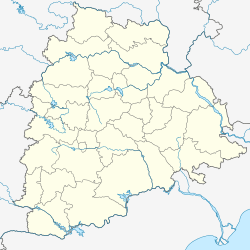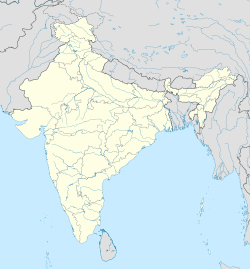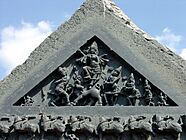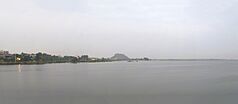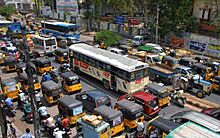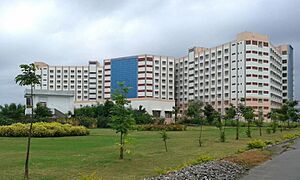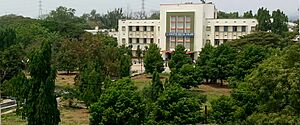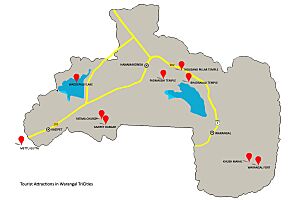Warangal facts for kids
Quick facts for kids
Warangal
Orugallu, Ekashila Nagaram
|
|
|---|---|
|
City
|
|
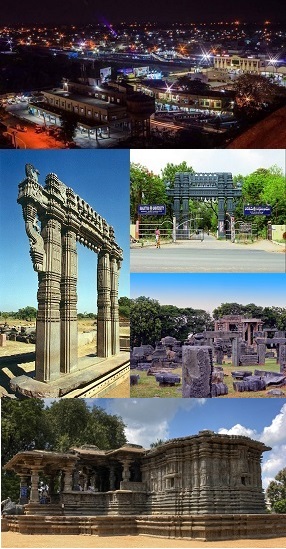
Clockwise from top: City view as seen from Govindarajula hill, Kakatiya University, Warangal Fort, Thousand Pillar Temple, Kakatiya Kala Thoranam
|
|
| Nickname(s):
Tri-City
|
|
| Country | |
| State | Telangana |
| District | Warangal district |
| Founded | 1163 |
| Founded by | Kakatiya dynasty |
| Government | |
| • Type | Municipal Corporation |
| • Body | Greater Warangal Municipal Corporation KUDA |
| Area | |
| • City | 406.97 km2 (157.13 sq mi) |
| • Metro | 1,805 km2 (697 sq mi) |
| Elevation | 288 m (945 ft) |
| Population
(2011)
|
|
| • City | 811,844 |
| • Rank | 2nd (Telangana) |
| • Density | 2,000/km2 (5,000/sq mi) |
| • Metro | 753,438 |
| Demonym(s) | Warangalite, Kakatiyan |
| Languages | |
| • Official | Telugu |
| Time zone | UTC+5:30 (IST) |
| PIN |
506001–506019
|
| Telephone code | +91–0870 |
| Vehicle registration | TG-03 AP-36 (Former) |
Warangal is a city in the Indian state of Telangana. It is the main city of Warangal district. With over 811,000 people in 2011, it is the second largest city in Telangana. The city covers an area of about 406 km2 (157 sq mi).
Warangal was once the capital of the Kakatiya dynasty, which started in 1163. The Kakatiyas built many amazing structures like forts, lakes, temples, and stone gateways. These old buildings make Warangal a popular place for tourists today. The famous Kakatiya Kala Thoranam gateway is even on the emblem of Telangana. Warangal is known as the cultural capital of Telangana.
The Indian government chose Warangal for its Heritage City Development scheme. It was also picked as a smart city. This means it gets extra money to improve its buildings and create more jobs.
The three cities of Kazipet, Hanamkonda, and Warangal are together called the Warangal Tri-City. These cities are connected by a major road, National Highway 163. They also have important train stations like Kazipet Junction railway station and Warangal railway station.
Contents
What's in a Name?
During the 160 years of Kakatiya dynasty rule (1163 to 1323 CE), Warangal had different names. These names included Orugallu, Ekashila Nagaram, and Omatikonda. All these names mean 'single stone'. This refers to a very large granite rock found inside the Warangal Fort.
In 1323 CE, the Delhi Sultanate took over the city. The ruler Juna Khan renamed it Sultanpur. But later, in 1336 CE, the Musunuri Nayaks took Warangal back. They changed its name to Orugallu again.
Warangal's History
Warangal was the old capital of the Kakatiya dynasty. Many kings and queens ruled here. Some famous rulers were Beta Raja I, Prola Raja I, and Prataparudra. Rani Rudrama Devi was a very special ruler. She was the only woman to rule the Telugu region.
Beta Raja I started the Kakatiya Dynasty. He ruled for 30 years. His son, Prola Raja I, moved the capital to Hanamkonda. Later, during Ganapathideva's rule, the capital moved back to Warangal. Old writings from the Kakatiya period say Warangal was the best city in the Telugu region.
The Kakatiyas built many amazing things. These include a strong fortress and four huge stone gateways. They also built the Swayambhu temple for Shiva and the Ramappa temple near Ramappa Lake. The famous traveler Marco Polo even wrote about the Kakatiyas' culture.
After the Kakatiyas, the Musunuri Nayaks ruled Warangal for 50 years. Then, the city became part of the Bahmani Sultanate. After that, it was part of the Sultanate of Golconda.
In 1687, the Mughal Empire took over Golconda. Warangal stayed part of the Mughal Empire until 1724. Then, the southern parts of the empire became the state of Hyderabad. This state included the Telangana region. In 1948, Hyderabad joined India. In 1956, Telangana, which includes Warangal, became part of Andhra Pradesh. Finally, on June 2, 2014, Telangana became a separate state. Warangal is now a proud part of Telangana.
Warangal's Location and Weather
| Weather chart for Warangal | |||||||||||||||||||||||||||||||||||||||||||||||
|---|---|---|---|---|---|---|---|---|---|---|---|---|---|---|---|---|---|---|---|---|---|---|---|---|---|---|---|---|---|---|---|---|---|---|---|---|---|---|---|---|---|---|---|---|---|---|---|
| J | F | M | A | M | J | J | A | S | O | N | D | ||||||||||||||||||||||||||||||||||||
|
15
30
15
|
5
33
18
|
5
37
22
|
7
40
26
|
15
42
28
|
50
37
28
|
85
32
25
|
170
31
25
|
160
33
23
|
70
33
22
|
10
31
18
|
0
29
14
|
||||||||||||||||||||||||||||||||||||
| temperatures in °C precipitation totals in mm source: mustseeindia.com |
|||||||||||||||||||||||||||||||||||||||||||||||
|
Imperial conversion
|
|||||||||||||||||||||||||||||||||||||||||||||||
Warangal is located at 18°00′N 79°35′E / 18.0°N 79.58°E. It is about 266 meters (873 feet) above sea level. The city is in the eastern part of the Deccan Plateau. This area has many granite rocks and hills. Because of this, farming depends a lot on rain.
There are no big rivers near Warangal. So, the city gets its water from the Kakatiya Canal. This canal brings water from the Sriram Sagar Project.
Warangal has a hot and dry climate for most of the year. Summer starts in March and gets very hot in May. Temperatures can reach around 42 °C (108 °F). The rainy season, called the monsoon, comes in June and lasts until September. It brings about 550 mm (22 in) of rain. A mild, dry winter starts in October and ends in early February. Winter temperatures are usually around 22–23 °C (72–73 °F).
Many hills and lakes are found around Warangal. Some famous hills with temples are Padmakshi hill, Mettu Gutta, and Govinda Rajula Gutta. Bhadrakali Lake, Dharmasagar lake, and Waddepally Lake are beautiful lakes. They also provide drinking water for the city.
People of Warangal
| Religions in Warangal | ||||
|---|---|---|---|---|
| Religion | Percent | |||
| Hindu | 83.41% | |||
| Muslim | 14.39% | |||
| Christian | 1.65% | |||
| Others† | 0.55% | |||
| †Includes Sikhs, Jains | ||||
| Historical population | ||
|---|---|---|
| Year | Pop. | ±% |
| 1901 | 31,186 | — |
| 1911 | 48,342 | +55.0% |
| 1921 | 46,791 | −3.2% |
| 1931 | 62,119 | +32.8% |
| 1941 | 92,808 | +49.4% |
| 1951 | 133,130 | +43.4% |
| 1961 | 160,000 | +20.2% |
| 1971 | 210,040 | +31.3% |
| 1981 | 338,910 | +61.4% |
| 1991 | 447,657 | +32.1% |
| 2001 | 530,636 | +18.5% |
| 2011 | 830,281 | +56.5% |
In 2011, the city of Warangal had a population of about 830,281 people. Most people in Warangal follow Hinduism, making up about 83% of the population. Islam is the next largest religion, with about 14% of the people. There are also smaller groups of Christians, Jews, and Buddhists.
Warangal's Economy
Warangal is a growing city in India. From 19% to 28% of its population now lives in urban areas.
Farming is a very important part of Warangal's economy. Farmers grow crops like rice, cotton, mango, and wheat. They rely on rain and the Godavari lift irrigation scheme for water. This scheme helps bring water from the Godavari river to dry areas. Warangal also has the second-biggest grain market in Asia, located in Enumamula.
The city is also growing in Information Technology (IT). Companies like Tech Mahindra and Cyient have opened offices here. Other IT companies are planning to open soon. In 2023, Kone, a company that makes elevators, also opened an office in Warangal.
Healthcare is another important industry. A large new hospital, the Warangal Multi Super Speciality Hospital, is expected to be finished in 2024.
Getting Around Warangal
Roads
Warangal is well-connected by roads and railways. Important roads like National Highway 163 and NH 563 pass through the city. The TSRTC runs many buses from Warangal and Hanamkonda bus stations. About 78 city buses travel on different routes within the city. Another 45 city buses connect Warangal to nearby villages. In 2024, work to make NH 563 a four-lane highway was almost finished.
Railways
Warangal has two main train stations: Kazipet and Warangal. These stations are on the important New Delhi-Chennai main line of Indian Railways. Kazipet Junction has special sheds for both electric and diesel train engines. Other smaller train stations in the city include Vanchanagiri and Pendial. A new third railway line is being built between Balharshah and Kazipet. In October 2023, the Hadapsar-Hyderabad Express train was extended to Kazipet. There are also plans for a new RapidX rail line from Warangal to Hyderabad.
Airport
Warangal has an airport at Mamnoor. It was built in 1930 by the Nizams. This airport was once the largest in undivided India. It had a long runway, pilot quarters, and a training center. It was used for cargo and Vayudoot services. During the Sino-Indian War, it was even used to store government planes. The airport was used until 1981.
Today, the airport is used as an NCC Training Centre. Young cadets use it for gliding, shooting, and building model airplanes. There are no regular passenger flights from this airport right now. However, in July 2023, the Telangana government approved plans to develop the Mamnoor Airport. They want to make it bigger so it can handle larger planes like the Boeing 747.
Learning in Warangal
Warangal has many schools and colleges, both government-run and private.
Universities and Colleges
- Kakatiya Institute of Technology and Science
- Kakatiya Medical College
- Kakatiya University
- Kaloji Narayana Rao University of Health Sciences
- National Institute of Technology, Warangal
- SR Engineering College
- SR University
- Vaagdevi College of Engineering
- Vaagdevi Engineering College
Schools
- Delhi Public School, Warangal
- Platinum Jubilee High School
- Srinivasa Ramanujan Concept School
- St. Gabriel's High School
Warangal's Culture
People who live in Warangal are often called Warangalites. The city is home to many famous historical sites. The Warangal Fort, Thousand Pillar Temple, and Ramappa Temple are all recognized as World Heritage Sites by UNESCO.
Other important places of worship include the Bhadrakali Temple, Padmakshi Temple, and Govinda Rajula Gutta. The Roman Catholic Diocese of Warangal and Kazipet Dargah are also notable.
The beautiful Bhadrakali Lake, Waddepally Lake, and Dharmasagar Lake are popular spots for visitors. The Bhadrakali Temple lake is being turned into a large park. This park will have walking paths, old caves, and places for animals to live.
The Ministry of Tourism in India has given Warangal the award for the best heritage city several times. This shows how special Warangal is for its history and culture.
Festivals
Warangal celebrates many colorful festivals. One popular festival is Bathukamma. Women celebrate this floral festival for nine days. They make beautiful flower arrangements and worship a goddess. They sing and dance around the Bathukamma at local temples. Another important festival is Bonalu, which is also a state festival.
The Sammakka Saralamma Jatara (Medaram Jatara) is a huge religious gathering. It honors a goddess at Medaram in Warangal district.
Food
The food in Warangal is mostly traditional Deccan dishes. For breakfast, people often eat Chapati and Puri. For main meals, they eat rice with different curries and curd.
Famous People from Warangal
- Anandhi, a film actress
- Tharun Bhascker, a film director and actor
- Chakri, a music director
- Chandrabose, a lyricist
- Daasarathi, a poet
- Rudrama Devi, the only woman to rule the Telugu region
- Manisha Eerabathini, a playback singer
- Arjun Erigaisi, a chess grandmaster
- Kothapalli Jayashankar, a professor
- Manju Latha Kalanidhi, a journalist
- Nand Kishore, a cricketer
- Nerella Venu Madhav, an impressionist and ventriloquist
- Pothana, a poet
- Chukka Ramaiah, an educationist
- Kaloji Narayana Rao, a poet
- P. V. Narasimha Rao, a former Prime Minister of India
- Eesha Rebba, a film actress
- Rudradeva (ruled c. 1158-1195), the first Kakatiya king
- Palkuriki Somanatha, a poet
- Sandeep Reddy Vanga, a film director
Images for kids
See Also
 In Spanish: Warangal para niños
In Spanish: Warangal para niños
 | John T. Biggers |
 | Thomas Blackshear |
 | Mark Bradford |
 | Beverly Buchanan |


